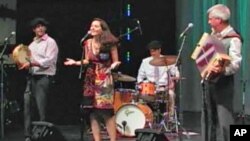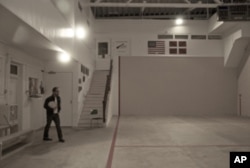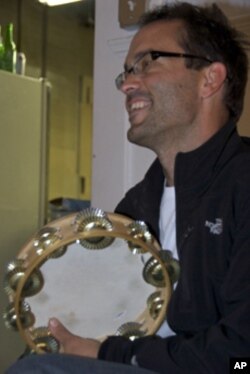Idaho is home to one of the largest Basque populations outside of Spain. They began arriving in the late 1800s to work as miners and sheep herders. Today there’s a vibrant Basque culture.
If you visit the state’s capital of Boise, you’ll find an entire city block dedicated to all things Basque including restaurants and a museum. You’ll also find tambourine player Sean Aucutt and his band, “Amuma Says No,” fusing traditional Basque music with rock.
Aucutt says Amuma Says No got its name in a roundabout sort of way. When the original band members were tossing around names one day, lead singer Jill Aldape told them her amuma - that’s grandmother in Basque - would be horrified at every name they suggested.
“She kept saying ‘My amuma wouldn’t like that’ and ‘I can’t be in a band named that,’" Aucutt recalls. "So finally I said ‘Let’s call it Amuma Says No.’ Everyone voted and it won.”
But, even though the band’s name means “grandmother says no,” hardly anyone can say no to the blend of traditional accordion and tambourine that’s kicked up a notch with drums, guitar and bass.
Aucutt and the band meet every week in the Fronton building in downtown Boise to practice. The building used to be a boarding house and eating hall for sheep herders who came from the Basque country.
“My great-grandmother used to cook here in this kitchen when she first came over,” says Aucutt. “It’s really special and I think a lot of our grandparents had friends and family come through here so it’s really neat. I feel like there are spirits around watching us and enjoying what Amuma Says No does.”
Aucutt grew up listening to folk music from the Basque country. He knew early on he had to be a part of this. He tried the violin as a kid, then the penny whistle and the accordion before settling on the tambourine.
“One of my friends played the pandero or tambourine and I said ‘Hey, can I give that a try?’ and he said ‘Yeah.’ Gave me one and he taught me a couple of things and I just started playing.”
The tambourine and accordion are at the heart of Basque music and of Amuma Says No.
“The Basques use the tambourine and the accordion because they are loud and they don’t need amplification,” says Aucutt.
That became important during the early 1900s when the Catholic church frowned on music and dancing.
“They could take the tambourine and the accordion up into the mountains to these small towns to have festivals and parties and they could go anywhere they wanted away from church and not be persecuted,” Aucutt says.
He actually went to the Basque Country to study music and ended up living with a master accordion player who helped him perfect his style.
“And I got to play with all these old accordion players that I had grown up listening to on old tapes and records.”
Now, some 17 years later, those old records and tapes influence Amuma Says No.
While this isn’t traditional Basque music, Aucutt says it still has the accordion and the tambourine.
“We’re a band that has so much fun together and we love each other. We’ll all really good friends and we just keep going and have fun and keep doing the things that give life into the Basque communities here in Boise and in other places.”
The band continues to work on a new cd that will feature mostly original songs. Meanwhile, Aucutt continues to join Amuma Says No each week at Fronton Building to practice - bringing the old country and the new together through music.






